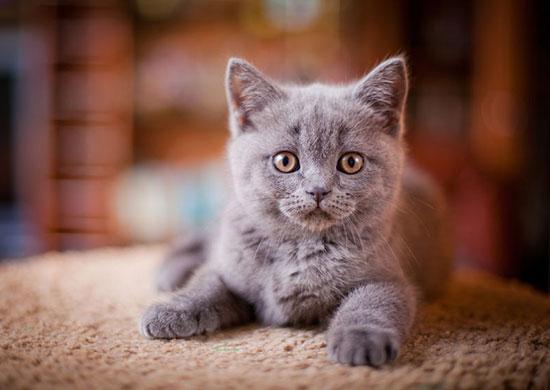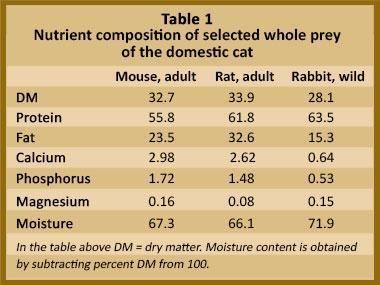Diet and Your Cat's Cancer Risk
- Updated: Saturday, June 01, 2019 06:02 PM
- Published: Saturday, July 23, 2016 02:54 PM
- Written by Elisa Katz, DVM
 Does what I feed my cat have anything to do with her chances of getting cancer? My friend's cat has cancer and now I want to do absolutely everything that I can to minimize my cat's chance of getting it.
Does what I feed my cat have anything to do with her chances of getting cancer? My friend's cat has cancer and now I want to do absolutely everything that I can to minimize my cat's chance of getting it.
What you feed your cat may very well play a role in his or her risk of the development of cancer.
Scientists and medical doctors have been aware of the link between chronic inflammation and cancer for over 100 years.¹ There is at least one laboratory that is performing blood tests to help determine the cancer risk in pets based upon detecting high levels of the substances that are known to be produced during inflammation.So, how does this all relate to your cat's diet? An inappropriate diet for an obligate carnivore can lead to a pro-inflammatory state.² Over time, this may significantly contribute to your cat's cancer risk. What do we mean by an inappropriate diet? For a cat, nature has built them to be hunters and eat a diet based around meat. In the wild, cats will subsist on small rodents and perhaps birds; rodents are a lot easier to catch because they can't fly away. As shown in Table 1, this type of diet would consist of certain amounts of protein, fat, bone, water and carbohydrate as well as any minerals the cat's body needs.³ Any diet that does not meet these vital requirements would be considered inappropriate for a cat. This includes any and all dry foods, even those that are grain-free. Dry diets have to be made using a process called extrusion. This process requires a certain amount of carbohydrate in order to bind the nugget so that it will stick together. For cats, any dry diet results in more carbohydrate than is ideal for this species. Dry diets also do not provide an appropriate amount of moisture to your cat. Cats have a low thirst drive, as they evolved mostly in the deserts of the world and were able to get most of their fluid intake from their prey, which typically contain about 70% water.
Dry diets have to be made using a process called extrusion. This process requires a certain amount of carbohydrate in order to bind the nugget so that it will stick together. For cats, any dry diet results in more carbohydrate than is ideal for this species. Dry diets also do not provide an appropriate amount of moisture to your cat. Cats have a low thirst drive, as they evolved mostly in the deserts of the world and were able to get most of their fluid intake from their prey, which typically contain about 70% water.
There are other factors regarding your cat's diet that can influence cancer risk, such as the presence of chemicals or chemical preservatives. Butylated hydroxyanisole, or
BHA, and butylated hydroxytoluene, or
BHT, are both suspected carcinogens that are used as preservatives in many packaged foods for both humans and animals.
⁴The presence of
GMOs or genetically modified plant ingredients may increase your cat's cancer risk. Many of these plants are modified to withstand higher amounts of herbicides such as glyphosate, or Roundup®, or even produce herbicides themselves.
⁵ ⁶ So, while it may not be the GMO plants themselves that are dangerous, they could harbor more pesticide and herbicide residues than conventionally grown crops.
⁷ Fortunately for cats, they do not require significant amounts of any plant material in their diet. But, it is also possible that the livestock that go into the cat's diet may have been fed GMOs. Livestock fed GMO plants could possibly harbor toxin residues, especially in the liver, as this is the main filtering organ for these substances.
⁸Lastly, other chemicals such as
bisphenol A, also known as
BPA, are sometimes used in the manufacture of cat food to prevent it from sticking to the can and lid. At least in humans, these chemicals have been linked to various cancers, including breast cancer.
⁹It is important that to reduce your cat's cancer risk you feed him or her the least processed diet possible. Processing may often concentrate carcinogens and can sometimes create carcinogens. Heating to the very high temperatures necessary to make most dry foods results in the production of
acrylamides, which have been linked to certain types of cancer in humans, and
heterocyclic amines, a known carcinogen.
¹⁰ ¹¹
Following the above recommendations is especially important if your cat already has cancer or perhaps has been diagnosed with
IBD, a possible precursor to cancer. Exposure to these chemicals can weaken their immune system and may encourage cancer growth. Remember, more than 70% of the immune system is within the GI tract.
Note: Feline Nutrition provides feline health and nutrition information as a public service. Diagnosis and treatment of specific conditions should always be in consultation with your own veterinarian. Feline Nutrition disclaims all warranties and liability related to the veterinary advice and information provided on this site.Dr. Elisa Katz, DVM, is a graduate of Ohio State University and is the owner of Natural Pet Animal Hospital in Bourbonnais, Illinois. She practices holistic and integrative medicine focusing on proper diet and nutrition. Dr. Katz shares her home with four kitties and one dog.1. H Lu, W Ouyang and C Huang, "
Inflammation, a Key Event in Cancer Development,"
Molecular Cancer Research 4, No. 4, April 2006, 221-33.2. LG Wood, N Shivappa, BS Berthon, PG Gibson and JR Hebert, "
Dietary Inflammatory Index is Related to Asthma Risk, Lung Function and Systemic Inflammation in Asthma"
Clinical and Experimental Allergy 45, no. 1, Jan 2015, 177-83.3. Ellen S. Dierenfeld, PhD, Heather L. Alcorn, BS, and Krista L. Jacobsen, MS, "
Nutrient Composition of Whole Vertebrate Prey (Excluding Fish) Fed in Zoos," U.S. Department of Agriculture, May 2002.4. "
Butylated Hydroxyanisole," National Toxicology Program, 13th Report on Carcinogens, October 22, 20145. D Cressey, "
Widely Used Herbicide Linked to Cancer,"
Nature, March 24, 2015.6. A Samsel and S Seneff, "
Glyphosate, Pathways to Modern Disease IV: Cancer and Related Pathologies"
Journal of Biological Physics and Chemistry 15, no. 3, Jan 2015, 121-129.7. T Bøhna, M Cuhraa, T Traavika, M Sandenc, J Fagand and R Primiceriob, "
Compositional Differences in Soybeans on the Market: Glyphosate Accumulates in Roundup Ready GM Soybeans,"
Food Chemistry 153, June 2014, 207-215.8. "
Pesticide Residues in Food 2004," Report of the Joint Meeting of the FAO panel of experts on Pesticide Residues in Food and the Environment and the WHO Core Assessment Group on Pesticide Residues, Rome, Italy, 20-29 Sept 2004.9. A Bhan, I Hussain, KI Ansari, SA Bobzean, LI Perrotti and SS Mandal, "
Bisphenol-A and Diethylstilbestrol Exposure Induces the Expression of Breast Cancer Associated Long Noncoding RNA HOTAIR in Vitro and in Vivo"
The Journal of Steroid Biochemistry and Molecular Biology 141, May 2014, 160-170.10. C Pelucchi, C Bosetti, C Galeone and C
La Vec, "Dietary Acrylamide and Cancer Risk: An Updated Meta-analysis,"
International Journal of Cancer 136, no. 12, Nov 2014.11. DW Layton, KT Bogen, MG Knize, FT Hatch, VM Johnson and JS Felton, "
Cancer Risk of Heterocyclic Amines in Cooked Foods: An Analysis and Implications for Research"
Carcinogenesis 16, no. 1, Jan 1995, 39-52.
 Does what I feed my cat have anything to do with her chances of getting cancer? My friend's cat has cancer and now I want to do absolutely everything that I can to minimize my cat's chance of getting it.
Does what I feed my cat have anything to do with her chances of getting cancer? My friend's cat has cancer and now I want to do absolutely everything that I can to minimize my cat's chance of getting it. Dry diets have to be made using a process called extrusion. This process requires a certain amount of carbohydrate in order to bind the nugget so that it will stick together. For cats, any dry diet results in more carbohydrate than is ideal for this species. Dry diets also do not provide an appropriate amount of moisture to your cat. Cats have a low thirst drive, as they evolved mostly in the deserts of the world and were able to get most of their fluid intake from their prey, which typically contain about 70% water.
Dry diets have to be made using a process called extrusion. This process requires a certain amount of carbohydrate in order to bind the nugget so that it will stick together. For cats, any dry diet results in more carbohydrate than is ideal for this species. Dry diets also do not provide an appropriate amount of moisture to your cat. Cats have a low thirst drive, as they evolved mostly in the deserts of the world and were able to get most of their fluid intake from their prey, which typically contain about 70% water.



